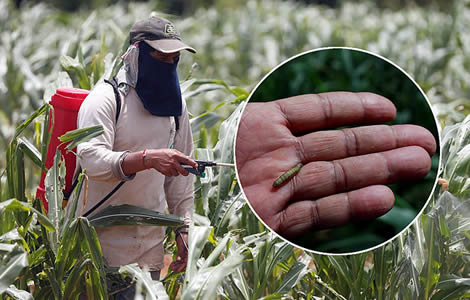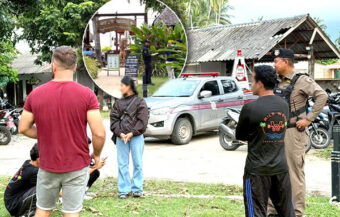The fall armyworm pest has already arrived in 50 out of 76 Thai provinces. It is a timely reminder of why farmers still need to retain the use of pesticides to protect food security in Thailand and in Southeast Asia. Agricultural experts are anxious about its impact in a region with warmer temperatures and less resourced or organised farming practices. There are also concerns about a wild fluctuation on reported damage to crops ranging from low single digits in some areas but up to 40% in others.
A deadly pest that destroys crops has arrived in 50 of 76 Thai provinces. The fall armyworm pest was first detected in Asia in July 2018 and has since found a home in Southeast Asia countries where experts believe that it could be far more dangerous and threatening than in other parts of the world. This is because of warmer, tropical temperatures and less resourced farming. On Wednesday, a 42 year old Thai farmer in Nakhon Ratchasima explained how 8 rai of corn that he had planted turned into a barren tract devoid of life when the fall armyworm pest invaded his farm. His crop was wiped out in three days. The pest particularly targets corn crops used in Thailand primarily for livestock feed. Experts fear its eventual impact could lead to higher prices for feed which in turn will raise food prices if the menace is not tackled. This will require expensive pesticide use and a deep rooted application. The invasive pest can never be rooted out in any land it descends upon.

With exports plummeting, falling farm prices and even an orange light appearing on Thailand’s tourists numbers, the last thing the incoming Thai government needs is another headache. But one has arrived in the form of a deadly pest which has reached Thailand and poses a danger to crops and Thai farmers, in particular the corn crop used to feed livestock.
Fall armyworm pest which attacks crops leaving devastation in its wake, has arrived in Thailand
This week Reuters reported on the devastating impact being wreaked by a pest that target farms and that has arrived in Asia and Thailand. Experts fear that the ideal climate for the pest and farming methods in countries like Thailand may exacerbate the threat posed by the pest. The fall armyworm is aptly named since it arrives in large numbers before moving on, leaving an occupation force behind, to attack other areas leaving more devastation in its wake.
Invasive pest has reached 50 of Thailand’s 76 provinces and is already wreaking devastation
It is reported that Thailand’s corn crop has already been impacted by the pest. The fall armyworm has already reached 50 of Thailand’s 76 provinces and, in particular, has taken root in the west of the kingdom where six provinces traditionally grow maize. The fall armyworm can actually attack a range of up to 80 different crops including rice and sugar cane but it has a preference for corn.
Thai farmers in Nakhon Ratchasima explains the devastation caused by the pest
On Wednesday, Thai farmer Puang Timdon, explained the devastating nature of the fall armyworm and its impact on his livelihood after it arrived at his farm in Nakhon Ratchasima province in Thailand’s northeastern region. One of the farmer’s fields was left empty, devoid of life, where once the farmer had looked forward to a thriving corn crop. The fall armyworm, a caterpillar type pest, destroyed it utterly. ‘All the eight rai I planted were all heavily infested,’ he told reporters from the Reuters News agency who came to visit him. The 42 year old Thai farmer lives in Ban Nong Tor town in the Pak Chong area of Nakhon Ratchasima which is 180 km from Bangkok. ‘The worm ate the whole field in three days, leaving so much damage that it wasn’t worth saving,’ he explained this week. Now he is trying to grow the crop again but must fight the menace of the fall armyworm which has not gone away.
Threat highlights the need for pesticides in agriculture so that food supply is maintained
The pest represents a warning to environmentalists who are demanding the removal of pesticides widely used as an aid to farming by farmers. The reality is that this pest can only be kept under control by strong pesticides and even then, the application of the pesticide must be deeply rooted. It thrives in tropical and subtropical climates. The fall armyworm has a lifespan of 24 to 40 days but reproduces quickly. Experts studying the invasive pest believe that up to 3 generations can exist within the time it takes an armyworm cohort to destroy a healthy crop in the field.
Arrival of the fall armyworm pest in Thailand has been a quiet one but concerns are growing
The arrival of the army worm in Thailand has been a quiet one but there is very real anxiety in Thailand and indeed among agricultural experts in neighbouring Asian nations, at what exactly the impact of the crop might be. The fall armyworm pest has existed and has been known to man for the last 200 years in North and South America. It has since spread to Africa and was first seen in Asia in July 2018 when it is reported to have arrived in Karnataka State.
Fall armyworm invasion can travel as far as 100 km in one night and cannt be eradiacted
Since then, it has spread fast. The fall armyworm pest can travel as fast as 100 km in one night from one infected location to another. In Thailand alone, it has caused severe damage so far to the corn crop used in the country to feed animal livestock. The real concern is that the pest may have found its most fertile ground to cause damage and disruption now that it has reached Southeast Asia and countries like Thailand. Experts also point out that once the pest have arrived in an area, it a cannot be completely eradicated only protected against.
Australian based agricultural economists suggests the pest could be food security threat in Asia
Expert bodies are becoming anxious. Phin Ziebell is an economist at National Australia Bank in Australia specialising in the agri sector. He believes that this menace could prove to be a real food security threat as it moves across Asia where many of the farmers are smaller, less organized and less resourced than those for instance in North America. Also the climate and warmer weather conditions heighten the danger posed by the pest. At the very least, the Australian economist reckons it will impose hardship on Asian farmers: ‘Management cost is an issue for small farmers,’ he said this week.
Wild variation on reported impact of the pest so far ranging from 1.2% to 40% devastation
Marjon Fredrix works with the UN Food and Agricultural Organisation (FAO). He has an equally stark message. He said that reports of damage, so far, from countries hit by the crop vary widely. In some cases, it is 1.2% to 10% but other countries have suggested a startling figure of 20 to 40%. He also explained that once the pest has arrived, it then becomes a constant threat and local farmers must forever take action to guard against it. This means the use of pesticides.
Across Thailand’s border China’s swine flu epidemic may have longer terms impact
Across Thailand’s northern border, the news of swine flu in China has largely been ignored by the media. It has already caused a huge cull of pigs and livestock. The fall armyworm pest is reported to have also reached 18 of 33 Chinese provinces and is already having an impact. China is the world’s second largest producer and consumer of corn. A manager who works with a company fighting the fall armyworm pest invasion pointed out this week that Chinese farmers have been impacted strongly because up to now, they have not relied on the use of pesticides to grow the versatile and robust corn crop. A government official in one of the provinces hit by the pest has confirmed extensive damage to corn and sugarcane crops.
Failure to tackle fall armyworm pest may lead to higher food prices and an economic jolt
The concern is that the combination of a cull of pigs in China and a reduction in corn production may cancel each other out and that the problem may not be tackled. The fear is that farmers raising livestock in the future may have to pay more for imported feed. In the United States, the price for futures on crops on the Chicago Exchange such as corn jumped by as much as 20% this week due to late planting of the crop. The impact of higher food prices, particularly in Asia where the cost of living has been stable, could be an unexpected jolt that the world economy cannot afford right now as it is already tensioned by trade disputes and sharp declines in world trade over the last 12 months.
Action required to protect and even treat the pest in Thailand will be expensive and difficult
Experts are warning of the need to avoid complacency about the threat posed by this pest as it has now arrived in Asia’s warmer and more tropical climate. They also point out that the use of insecticide to ward of the threat and even just to contain it will involve a complex and expensive procedure allowing the insecticide penetration to the core of the crop stems.
Paul Voutier works with Grown Asia, a Singapore based organization backed by the World Bank. He warns that the job of protecting crops from the fall armyworm pest will be ‘costly and difficult’ and that an alternative to traditional pesticides may be required.


















